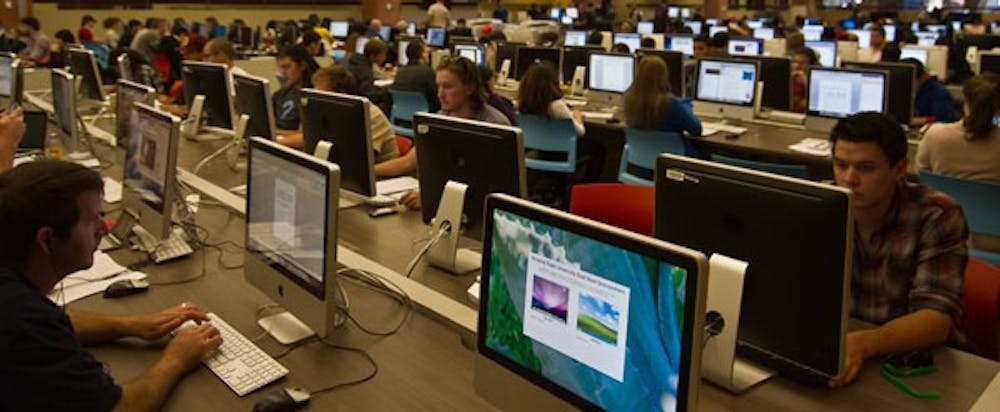 Large computing commons like this one at the Tempe campus show that students have a need for online resources. The University is looking to develop its own MOOCs, massive online courses offered without credit at schools like Columbia, to keep up with changes in education and technology. (Photo by Vince Dwyer)
Large computing commons like this one at the Tempe campus show that students have a need for online resources. The University is looking to develop its own MOOCs, massive online courses offered without credit at schools like Columbia, to keep up with changes in education and technology. (Photo by Vince Dwyer)ASU technology officials are developing massive open online courses and hope to offer at least one by July, said Phillip Regier, executive vice provost and dean of ASU Online and Extended Campus.
Regier said ASU officials and faculty are still determining the structure and content of the MOOCs but plan on doing them differently than most universities and websites.
“We aren’t just taking a course we already teach and putting it online for free,” he said. “Our MOOC will highlight different aspects of what makes ASU a great learning and teaching institution for those outside the University.”
The Chronicle of Higher Education recently reported that ASU had chosen Blackboard as its platform provider for MOOCs, but Regier said the report was false and that the University has yet to choose a company.
“We need to make the platform decision in the next couple of months, but Blackboard doesn’t have a platform that would work for us right now, so no choice has been made yet,” he said.
In an October interview with The State Press, ASU President Michael Crow said the University is developing MOOCs because they are an excellent learning platform, but he is not sure what they will mean to higher education in the long run.
“It’s a fabulous development,” he said. “Hopefully there will be thousands of MOOC courses, some of which that can be integrated into a curriculum.”
Crow said people taking MOOCs offered by other universities, such as Columbia and Harvard, cannot earn credit or certifications.
“None of those schools will ever offer any certificate because their price is determined by the scarcity of their product,” he said.
Crow said some schools are looking into offering MOOCs for credit, but he is unsure where ASU stands on that issue.
Crow said some MOOCs have more than 100,000 students enrolled, but on average only one-tenth will actually complete the course.
Regier said MOOCs are validating the idea that an excellent education can be obtained online, a stance which he has supported for years.
“MOOCs have changed the conversation around higher learning,” he said. “They haven’t yet proven that people can learn this way, but they have generated a lot of interest in a way that is a net positive for discussion around higher education.”
Higher Education Students Association President Jared Black said universities have always been progressing and embracing technology, and MOOCs are a logical next step in higher education.
“What we’re seeing is the cusp of being able to embrace online learning models,” he said. “So the question now is how do we incorporate those into our higher education setting.”
Black, a graduate student in higher and postsecondary education, said ASU is proving it is a pioneer in the future of higher education by developing MOOCs.
“By embracing the MOOC model and online platforms, ASU is staying relevant with the trends of higher education,” he said. “The MOOC model is where our country is headed, and ASU is leading the charge.”
However, MOOCs cannot replace traditional classroom environments because they provide no hands-on experience, Black said. He said it would be difficult for professors to have one-on-one interaction with students who are struggling in such an extensive platform.
Educational leadership and innovation professor Wilhelmina Savenye said she has been teaching online classes for 12 years and is excited about the MOOCs movement.
“It may mean that there is one more option for what a university wants to do with online learning, but I don’t think it will change all of higher education,” she said
Savenye said ASU has been very knowledgeable and progressive in developing education technology initiatives, but it is too early to tell what the exact impact of MOOCs will be.
“With technology changing so fast, students and teachers are constantly dealing with different ways of learning,” she said. “It’s kind of like the Wild West. We will just have to stay on our toes and see what happens.”
Reach the reporter at npmendo@asu.edu




